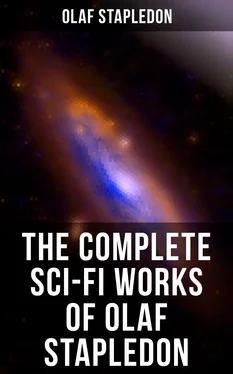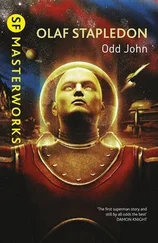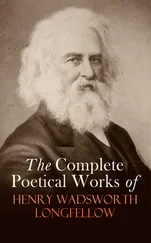Olaf Stapledon - The Complete Sci-Fi Works of Olaf Stapledon
Здесь есть возможность читать онлайн «Olaf Stapledon - The Complete Sci-Fi Works of Olaf Stapledon» — ознакомительный отрывок электронной книги совершенно бесплатно, а после прочтения отрывка купить полную версию. В некоторых случаях можно слушать аудио, скачать через торрент в формате fb2 и присутствует краткое содержание. Жанр: unrecognised, на английском языке. Описание произведения, (предисловие) а так же отзывы посетителей доступны на портале библиотеки ЛибКат.
- Название:The Complete Sci-Fi Works of Olaf Stapledon
- Автор:
- Жанр:
- Год:неизвестен
- ISBN:нет данных
- Рейтинг книги:5 / 5. Голосов: 1
-
Избранное:Добавить в избранное
- Отзывы:
-
Ваша оценка:
- 100
- 1
- 2
- 3
- 4
- 5
The Complete Sci-Fi Works of Olaf Stapledon: краткое содержание, описание и аннотация
Предлагаем к чтению аннотацию, описание, краткое содержание или предисловие (зависит от того, что написал сам автор книги «The Complete Sci-Fi Works of Olaf Stapledon»). Если вы не нашли необходимую информацию о книге — напишите в комментариях, мы постараемся отыскать её.
Novels:
Last and First Men: A Story of the Near and Far Future
Last Men in London
Odd John: A Story Between Jest and Earnest
Star Maker
Darkness and the Light
Sirius: A Fantasy of Love and Discord
Death into Life
Short Stories:
The Flames (1947)
The Seed and the Flower
The Road to the Aide Post
A Modern Magician
East is West
A World of Sounds
Arms Out of Hand
The Complete Sci-Fi Works of Olaf Stapledon — читать онлайн ознакомительный отрывок
Ниже представлен текст книги, разбитый по страницам. Система сохранения места последней прочитанной страницы, позволяет с удобством читать онлайн бесплатно книгу «The Complete Sci-Fi Works of Olaf Stapledon», без необходимости каждый раз заново искать на чём Вы остановились. Поставьте закладку, и сможете в любой момент перейти на страницу, на которой закончили чтение.
Интервал:
Закладка:
and the deep-rooted hills
fade.
They last but for a little while;
as cloud-tresses among the rocks,
they vanish.
And as a smile gleams and fades,
so for a very little while,
Life rejoices the earth.
From the beginning fire,
then frost, endless.
And between, the swift smile, Life.
From the beginning fire,
then frost, endless,
and between,
Mind.
Paul ventured to show these poems to the Archangel. The young author was diffident about them, and did not expect them to be taken very seriously; but the manner in which the Archangel received them was something of a shock to him. Gently but also emphatically the priest told him that he was in danger of serious heresy. God could not be the soul of the world, since he had created the world and would survive the world. As for the cosmic egg, and still more the evanescence of life in the universe, Paul ought to realize that such bizarre ideas were dangerous, since they obscured the central fact of religion, namely the direct and eternal intercourse between God and man. Surely that amazing fact was far more interesting than these grotesque fancies. Paul was so upset that he turned actually dizzy and faint. No wonder, for here was the being whom he respected above all others and even took to be in some manner divine, condemning ideas which to Paul himself seemed to have very far-reaching and very beautiful significance.
This experience was the beginning of a long period of heart-searching in which Paul became increasingly aware of being torn in two directions, namely, toward the Archangel and toward something which he could not yet at all clearly see. He began to oscillate between two moods. One was a mood of interest in personality and the personal God whom man had rightly or wrongly conceived in his own image. The other was a mood of revulsion from man and his God, and of interest in all that vastness within which man is but a tremulous candle-flame, very soon to be extinguished. He could not integrate these moods in one. Yet whichever was the mood of the day, he felt obscurely but strangely that it was incomplete, that somehow the other was just as necessary, though at the moment he could not feel it. On the one hand was the Archangel, and Jesus, and all the humbler beauties of human persons. On the other was the rippled lake, the stars, the whole vast intricacy of nature. On the one hand was Love, and on the other the more mysteriously beautiful thing, Fate. And Life, how did Life relate itself to this profound dichotomy of the spirit? When he was in what he called the Archangel mood, he could without difficulty extend his interest so as to regard the story of evolution as the story of a great crusade of myriads of spirits freely striving to achieve some glorious end in praise of God, and sacrificing themselves by the way in myriads of casualties. When he was in the mood of the stars, he regarded the same great story as one somewhat intricate system of wave-trains spreading its innumerable undulations in ever-widening, ever-fading circles on the surface of existence, presently to vanish. Strange that, so long as he remained in the mood of the stars, this thought did not outrage him. He accepted it, not with reluctance, but with joy.
It was while he was still only beginning to discover the existence of these two moods in himself that Paul had to decide once and for all what he would do in the world. The Archangel said, ‘If your faith is secure, prepare to become a priest of the one God. If it is not secure, find some solid practical work to do in the service of man.’ Paul’s faith was not secure. On the other hand, he dreaded the thought of being caught up in the mills of business or industry. And he did seriously desire to play some part in the great work of salvation. If it was not for him to turn men’s attention to Jesus, at least he might turn the attention of the young to the many lovely features of existence. After much agonized hesitation he finally decided that he must become a teacher. He therefore persuaded his family to let him take a diploma, hoping that a thorough preparation would do away with his proved incompetence with boys. At the outbreak of the European War he was about to take up his first post, in one of the large suburban secondary schools of the Metropolis.
For some months Paul was engaged on what seemed to him a life and death struggle in two entirely different spheres. While he was desperately trying to acquire the art of teaching, he was at the same time, and increasingly, concerned with an unprecedented fact in his world, namely, the European War. Presently this fact gave rise to a new and bewildering personal problem, namely, the problem of his own conduct in a war-racked world.
At the school he had set out to inspire his pupils with the love of ‘culture’. In fact he took the work very seriously. He spent many hours in preparation and correction, but was always behindhand, and therefore in class always uncertain. The boys soon found him out, and took delight in tripping him. He became more and more insecure. On the side of discipline also he came to grief, though he had excellent theories on this subject. Discipline, he argued, should be self-imposed, not imposed by others. Unfortunately such discipline is the most difficult to inculcate, especially amongst rebellious young animals who have been brought up on something different. Paul himself had none of that native and unconscious authority which alone could have ensured success in such circumstances. The boys soon found that good sport was to be had by baiting him. He changed his method, and tried to impose order, but could achieve no more than a partial suppression of disorder. The more tyrannous his control, the more gleefully did rebellion raise her hydra heads. Things came to such a pass that one afternoon when the last class was over, and the boys had stampeded away along the corridor, Paul, seated upon his dais, dropped his head forward on his chalk-dusty hands. I felt tears trickle through his fingers on to the desk. The syllables of a desperate prayer formed themselves in his throat and on his lips. ‘Oh, God, oh, God,’ he cried, ‘make me different from what I am.’ It seemed to him that he had reached the very rock-bottom of despair. For this despair was more acutely conscious, more precisely formulated than any of his earlier despairs. He was a grown man (so he imagined), and completely incompetent to deal with life. In adolescence his dread had been that he himself would miss fulfilment, that he would ‘get stuck’, stranded, and never explore the promised lands of life. But now he dreaded far more (so he persuaded himself) that he would never be able to do anything even of the humblest order ‘to the glory of God’. This was now his master-motive, to pull his weight, to do a man’s work, to be able to look his fellows in the eyes and say, ‘Of course I am nothing out of the common, but you can see that I am pulling my weight.’ He longed to cut adrift and start all over again at something else. But at what? Outside his little prison there was nothing but the war. The boys were already skilfully torturing him about the war. Then why did he not go? He would make a wretched soldier, but the Government said that every one was needed. Even if he merely got himself shot, he would have ‘done his bit’. And he would be quit of all this misery.
For some while he continued to lie with his head in one hand, while the other crumpled the harsh black folds of his gown. To go and be a soldier. What did it really mean? Military discipline. Doing stupid things just because you were told to. Pushing bayonets into straw dummies, and later into live bellies. Feeling those jagged shell splinters tear through your own flesh and bones. It was all inconceivably horrible. But apparently it had to be, since Civilization was in danger. Then surely he must go. And how good to be out of all this fiasco of teaching. Anything was better than that. How good to surrender one’s conscience into the keeping of the army. That way surely lay peace of mind. Like surrendering your conscience to the Church. Give it to a general to look after. Yes, he must not stand aside any longer from the great spiritual purification and revival that the Archangel said was coming out of the war. It had begun already. The war was helping people to get out of themselves, helping them to see Jesus. The Archangel said so. Yes, he would enlist. Then there would be nothing to do but to obey, be courageous, relentless. Then all his troubles would be escaped. Just set your teeth and be a hero. So easy, compared with this work that was simply beyond him. He looked at his watch. Late! And he wanted to get his hair cut before catching the train home. Hurriedly he began to gather up his books.
Читать дальшеИнтервал:
Закладка:
Похожие книги на «The Complete Sci-Fi Works of Olaf Stapledon»
Представляем Вашему вниманию похожие книги на «The Complete Sci-Fi Works of Olaf Stapledon» списком для выбора. Мы отобрали схожую по названию и смыслу литературу в надежде предоставить читателям больше вариантов отыскать новые, интересные, ещё непрочитанные произведения.
Обсуждение, отзывы о книге «The Complete Sci-Fi Works of Olaf Stapledon» и просто собственные мнения читателей. Оставьте ваши комментарии, напишите, что Вы думаете о произведении, его смысле или главных героях. Укажите что конкретно понравилось, а что нет, и почему Вы так считаете.












